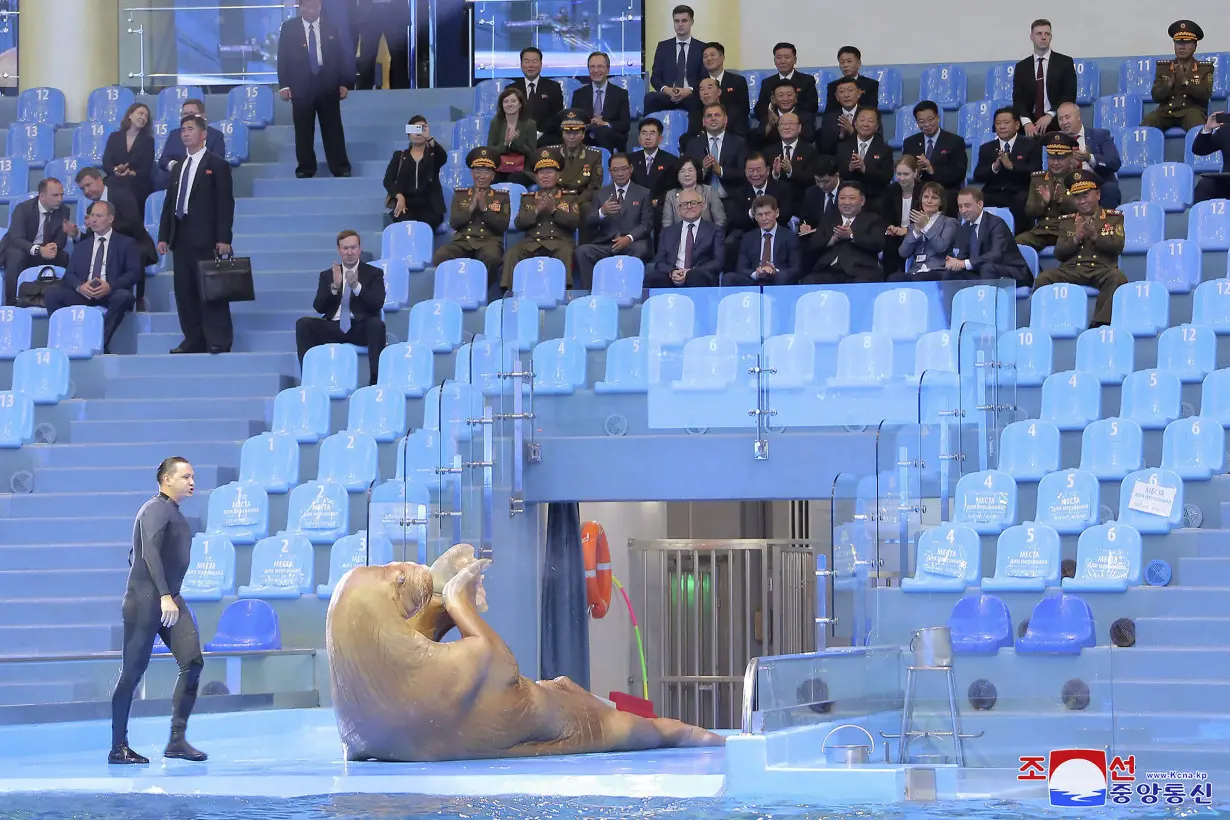MADISON, Wis. (AP) — The Republican-controlled Wisconsin Senate voted Thursday to fire the battleground state’s nonpartisan top elections official, prompting a legal challenge from Democrats who say the vote was illegitimate.
Democratic Attorney General Josh Kaul said in a lawsuit that Senate Republicans don't have the authority to oust Wisconsin Elections Commission Administrator Meagan Wolfe and accused them of attacking the state's elections.
It's the latest in a whirlwind of deep partisan divisions in Wisconsin, where Republicans who control the Legislature are threatening to impeach a newly elected Supreme Court justice before she's even heard a case. They're also floating plans to overhaul the state's electoral maps before the high court can toss out current boundaries that favor the GOP.
The fight over who will lead the elections agency stems from persistent lies about the 2020 election and creates instability ahead of the 2024 presidential race for the state’s more than 1,800 local clerks who actually run elections.

Wolfe has been the subject of conspiracy theories and target for threats from election skeptics who falsely claim she was part of a plan to rig the 2020 vote in Wisconsin, and GOP leaders cited concerns from those skeptics in justifying Thursday’s 22-11 vote along party lines.
She said Thursday she will not “bend to political pressure” and will continue to serve as administrator at least through the end of the 2024 election unless a court rules otherwise or the elections commission votes to remove her.
“The Senate’s vote today to remove me is not a referendum on the job I do but rather a reaction to not achieving the political outcome they desire,” Wolfe said. “The political outcome they desired is to have someone in this position of their own choosing that would bend to those political pressures.”

“Wisconsinites have expressed concerns with the administration of elections both here in Wisconsin and nationally," said Majority Leader Devin LeMahieu. “We need to rebuild faith in Wisconsin's elections.”
But numerous reviews have found that the 2020 election in Wisconsin was fair and the results were accurate. Biden defeated Trump in 2020 by nearly 21,000 votes in Wisconsin, an outcome that has withstood two partial recounts, a nonpartisan audit, a conservative law firm’s review, and multiple state and federal lawsuits.
Election observers have voiced concerns that replacing Wolfe with a less experienced administrator or continuing to dispute her position ahead of the 2024 contest could create greater instability in a high-stakes presidential race where election workers expect to face unrelenting pressure, harassment and threats.

“Wisconsin Republicans’ attempt to illegally fire Wisconsin’s elections administrator without cause today shows they are continuing to escalate efforts to sow distrust and disinformation about our elections, denigrate our clerks, poll workers, and election administrators, and undermine basic tenets of our democracy, including the peaceful transfer of power," Democratic Gov. Tony Evers said in a statement.
At Evers' request, Kaul sued GOP legislative leaders and asked a judge to rule that the Senate’s vote has no legal effect and that Wolfe will remain in charge of the elections commission. Meanwhile, Republicans introduced a resolution calling on the elections commission to appoint an interim administrator to replace her.
“The state Senate has blatantly ignored Wisconsin law in order to put its stamp of approval on baseless attacks against elections,” Kaul said. “(Wolfe) remains the administrator. The court, I’m very confident, will confirm that.”

The bipartisan elections commission deadlocked in June on a vote to nominate Wolfe for a second four-year term. Three Republicans voted to nominate her and three Democrats abstained in the hopes of preventing a nomination from proceeding to the Senate for confirmation.
Senate rejection would normally carry the effect of firing her, but without a four-vote majority nominating Wolfe, a recent state Supreme Court ruling appears to allow her to stay in office indefinitely as a holdover.
Senate Republicans in June pushed ahead with forcing a vote despite not receiving a nomination from the commission. LeMahieu said he interpreted the commission's 3-0 vote as a unanimous nomination. The Legislature's nonpartisan attorneys and Democratic Attorney General Josh Kaul have both contested that interpretation, saying the law is clear that an elections administrator must be nominated by at least four commissioners.

Wolfe did not attend a Senate committee hearing on her reappointment last month, citing a letter from Kaul saying “there is no question” that she remains head of the elections agency. That hearing instead became a platform for some of the most prominent members of Wisconsin's election denialism movement to repeat widely debunked claims about the 2020 election.
“It’s hard to believe we’re still at a place where those now very well analyzed and debunked claims about our system seem to still be driving decisions,” Wolfe said Thursday.
Many of the same skeptics were present in the Senate gallery on Thursday, cheering when the vote passed.

Many Republican grievances against Wolfe are over decisions made by the elections commission and carried out by Wolfe, as she is bound by law to do. In addition to carrying out the decisions of the elections commission, Wolfe helps guide Wisconsin’s more than 1,800 local clerks who actually run elections.
Wolfe became head of the elections commission in 2018, after Senate Republicans rejected her predecessor, Michael Haas, because he had worked for the Government Accountability Board. GOP lawmakers disbanded the agency, which was the elections commission's predecessor, in 2015 after it investigated whether former Republican Gov. Scott Walker's campaign illegally worked with outside groups.
Since the 2020 election, some Republicans have floated the idea of abolishing or overhauling the elections commission.

Wolfe has worked at the elections commission and the accountability board for more than 10 years. She has also served as president of the National Association of State Election Directors and chair of the bipartisan Electronic Registration Information Center, or ERIC, which helps states maintain accurate voter rolls.
___
Harm Venhuizen is a corps member for the Associated Press/Report for America Statehouse News Initiative. Report for America is a nonprofit national service program that places journalists in local newsrooms to report on undercovered issues.

 What to know about Trump's attorney general pick Pam Bondi as she faces questioning on Capitol Hill
What to know about Trump's attorney general pick Pam Bondi as she faces questioning on Capitol Hill
 Rubio vows to place US interests 'above all else' as Trump's top diplomat
Rubio vows to place US interests 'above all else' as Trump's top diplomat
 Manatees congregate in warm waters near power plants as US winter storms graze Florida
Manatees congregate in warm waters near power plants as US winter storms graze Florida
 Nippon Steel wants to work with Trump administration on US Steel deal, Mori tells WSJ
Nippon Steel wants to work with Trump administration on US Steel deal, Mori tells WSJ
 After cable damage, Taiwan to step up surveillance of flag of convenience ships
After cable damage, Taiwan to step up surveillance of flag of convenience ships
 BOJ will raise rates if economy, price conditions continue to improve, Ueda says
BOJ will raise rates if economy, price conditions continue to improve, Ueda says
 AAPI adults prioritize immigration, but split on mass deportations: AP-NORC/AAPI Data poll
AAPI adults prioritize immigration, but split on mass deportations: AP-NORC/AAPI Data poll
 As fires ravage Los Angeles, Tiger Woods isn't sure what will happen with Riviera tournament
As fires ravage Los Angeles, Tiger Woods isn't sure what will happen with Riviera tournament
 Antetokounmpo gets 50th career triple-double as Bucks win 130-115 to end Kings' 7-game win streak
Antetokounmpo gets 50th career triple-double as Bucks win 130-115 to end Kings' 7-game win streak
 Zheng loses to No 97 Siegemund, Osaka rallies to advance at the Australian Open
Zheng loses to No 97 Siegemund, Osaka rallies to advance at the Australian Open








